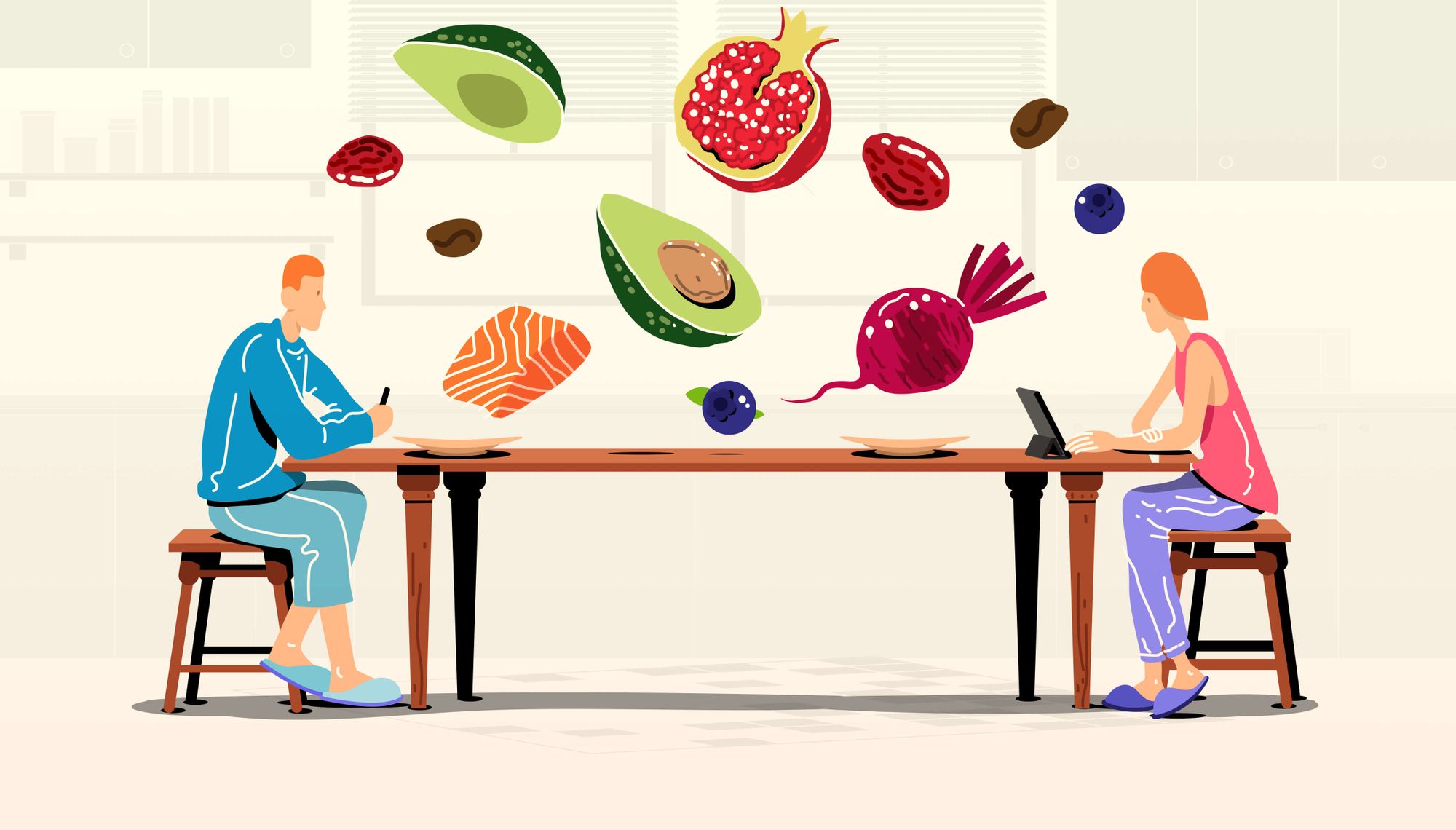Advertising articles and diets based on superfoods can promise a lot, from weight loss to slowing down the process of ageing.
Really, the whole superfood idea is quite catchy: why work on changing your habits when you can just add goji berries to your diet? Why watch over your nutrition if putting chia seeds in your breakfast cereal will solve all your health problems?
Superfoods create a lot of questions, so today Atlas Biomed is answering some of them.
What are superfoods?
The concept of a "superfood" is not new. The idea first appeared at the beginning of the 20th century. Then the superfood was bananas, lauded as a "natural protection against bacteria." Bananas do not seem special anymore, but other foods have stepped up to take their place. These foods are most often discussed in beauty blogs and lifestyle articles.
There is no precise definition of a "superfood". In general, they are just foods with high nutritional values. Superfoods usually include vegetables, fruits, whole grains, legumes and nuts. Nutritionists already consider all of these products to be part of healthy diet.
What is their superpower?
The hype around superfoods is mostly built up by marketers. It produces high expectations and people really believe that these foods will protect them from chronic diseases. Add one or two of them to your diet, and you can stop worrying about rest of your unhealthy diet. Therefore, many professional nutritionists try to avoid the term "superfood".
On the other hand, some products can really be more useful than others. Many fruits, vegetables, nuts and seeds contain vitamins and healthy micronutrients. Here is what science has to say about the most famous superfoods.
Avocado
Expectations
Technically, it's a fruit, not a vegetable. (To be precise, it’s a big berry). Avocados contain monounsaturated fats that help reduce the risk of cardiovascular disease. In 2013, researchers published a review about the special benefits of avocado for the cardiovascular system.
Reality
Monounsaturated fats are good for you, but they can also be obtained from oily fish, nuts, raw olive oil and sunflower oil.
In fact, the 2013 study was paid for by a well-known avocado producer. So far, there haven’t been any other reliable independent studies on the health effects of avocados.
Green tea
Expectations
In China, green tea has been used for centuries to fight headaches and depression. Green tea leaves are less fermented than black tea, so they contain more antioxidants. Supposedly, green tea helps you lose weight, lowers cholesterol, fights cardiovascular diseases and even reduces the risk of cancer and Alzheimer's disease.
Reality
This list of health benefits has no clinical evidence, but it is true that green tea helps to reduce blood pressure and prevents tooth decay. Green tea contains vitamin B, folic acid, manganese, potassium, magnesium and caffeine.
Chia seeds
Expectations
These popular seeds from Mexico contain a lot of omega-3, which is a class of unsaturated fatty acids. In 100 grams of chia seeds, there is 8x more omega-3 than in salmon. People claim that Chia seeds are an excellent source of energy and help out in losing weight and normalizing blood pressure.
Reality
Chia seeds also contain a lot of carbohydrates, protein, fibre and calcium. The molecular structure of Omega-3 in chia differs quite a bit from the omega-3 in fish: the fish one is docosahexaenoic acid, and chia's is alpha-linolenic acid. And the less common omega-3 from chia is absorbed less efficiently.
Omega-3 does reduce the risk of cardiovascular disease and dementia, but there is no strong evidence that chia seeds are more efficient in that than other sources of omega-3.
Eating chia seeds may be associated with weight loss exactly because people start to eat them when they become concerned about their weight, which is the first step to getting fit anyway.
Omega-3 can be found in oily fish. If you follow the Mediterranean diet, you probably don't have to add any chia seeds to your diet. Only if you like the taste.
Blueberries
Expectations
We all know that blueberries are delicious and healthy. They improve memory, lower the risk of cancer and prevent atherosclerosis.
Reality
Actually, there is no reliable research that blueberries can do all these things. But they do contain a few calories and a lot of nutrients, including phenolic compounds with an antioxidant capacity that is significantly higher than that of vitamins C or E.
Oily fish
Expectations
Fatty fish, such as anchovy, carp, salmon, trout, tuna (fresh, not canned), mackerel and sprat, got a lot of attention after scientists observed that Eskimos, whose diet consists mainly of fatty fish, rarely have cardiovascular diseases. Eating oily fish helps prevent the formation of prostate cancer and of rheumatoid arthritis. It also improves vision.
Reality
The beneficial effects of eating fatty fish have really been proven! It can help lower blood pressure and reduce the accumulation of fat in the arteries.
To avoid food poisoning, choose raw fish. But if you do buy pre-cooked fish, definitely do not store it next to your raw fish. Additionally, pregnant and breastfeeding women and for children should limit their daily intake of fatty fish.
Goji berries
Expectations
Goji berries have been big in traditional Chinese medicine for thousands of years. Advertisers promise they will reduce the risk of cancer and cardiovascular disease.
Reality
Traditional Chinese medicine and alternative medicine in Europe is not supported by scientific studies, so goji berries’ long history can’t count as an argument. The claim that goji berries can reduce the risk of developing cancer, heart disease and improve immunity requires evidence.
Beetroot
Expectations
Beetroot is a good source of iron and folic acid. It also contains betaine, nitrates, magnesium and other antioxidants. Studies show that the use of beet juice before training sessions can increase your endurance by allowing better oxygen supplies to the tissues.
Reality
The beneficial effects of beet juice on professional athletes has not been proven yet. The hypothesis that beet juice can prevent dementia needs to be verified as well.
Like other leafy green vegetables, beetroot, cabbage and celery should be a part of a balanced diet since their nitrate content can help lower blood pressure. Nitrates from beet family vegetables are formed naturally; once in the body, natural nitrates turn into nitric oxide, so they are harmless.
Pomegranate
Expectations
It is believed that pomegranate juice can reduce cholesterol deposits on arterial walls, improve blood circulation in the heart and prevent prostate cancer.
Reality
There aren’t any convincing studies behind these statements.
Actually, pomegranate contains many antioxidants (especially in the peel, which humans don’t eat), but we can't be sure that large doses of antioxidants really improve one’s health.

Cocoa beans
Expectations
A wave of interest in cocoa emerged after studies of the peoples of Central America, great lovers of cocoa drinks. According to research, the Kuna Indians have a much lower risk of stroke and heart disease. Cocoa also prevents cancer and improves your mood.
Reality
Cocoa beans do seem to reduce pressure, but more studies are needed. Their cancer-preventing qualities have been studied even less. But in any case, cocoa is a good source of iron, magnesium, manganese, phosphorus and zinc.
So is there any sense in eating superfoods?
Superfoods are great when included in a healthy diet of whole grains, vegetables and fruits. It is not correct to say, however, randomly eating a superfood just once can compensate regular trips to fast food joints and litres of sugary soda.
👆Remember
1. Superfoods are foods with high nutritional values.
2. They are good as part of a balanced diet.
3. To give yourself a sufficient number of nutrients, you need to diversify your diet and change your eating habits.
4. Five to six servings of fruits and vegetables a day is the perfect way to start.
- The truth about ‘miracle foods’ — from chia seeds to coconut oil.
- Herbal medicines.
- Levinovitz A. The Gluten Lie: and other myths about what you eat. New York, 2015.
- Hass avocado composition and potential health effects.
- Fish and shellfish.
- Ferreira C., Fomes L., Silva G., Rosa G. Effects of chia consumption on cardiovascular risk factors in humans. Nutricion Hospitalaria 2015; 32 (5): 1909–1918.
- What’s so super about superfoods?
- The truth about chia.
- Burdge G.C. Metabolism of a-linolenic acid in humans. Prostaglandins, Leukotrienes and Essential Fatty Acids, 2006; 75: 161–168.
- Cardiovascular disease.
- What are superfoods?
- The truth about superfoods.
















